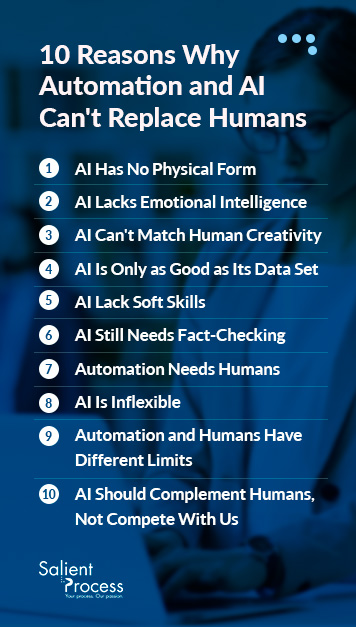We can't find the internet
Attempting to reconnect
Something went wrong!
Hang in there while we get back on track

What Can’t AI Replace
AI is rapidly evolving and transforming various industries, but there are several key areas where human skills and attributes remain irreplaceable. These roles often require emotional intelligence, creativity, nuanced judgment, and complex problem-solving abilities that AI currently cannot replicate. Below are some of the primary job categories that AI is unlikely to replace:
1. Social Workers
Social work is fundamentally rooted in empathy, trust, and emotional insight. Social workers engage with individuals facing significant life challenges such as poverty, abuse, and mental health issues. The ability to connect on an emotional level is crucial in this field. For instance, a social worker must navigate complex ethical dilemmas that involve confidentiality and the safety of vulnerable individuals—situations that require a depth of understanding and moral reasoning that AI lacks.
2. Performing Arts
The performing arts encompass a wide range of creative expressions including acting, singing, dancing, and live performances. While AI can assist in certain aspects of production or even generate music or visual art, it cannot replicate the authentic human experience involved in performing arts. The nuances of human emotion conveyed through performance are irreplaceable; actors bring their unique interpretations to roles that resonate with audiences on a personal level.
3. Doctors and Healthcare Workers
In healthcare, while AI can enhance diagnostic capabilities and assist in treatment planning through data analysis, it cannot replace the essential human elements of care provided by doctors and nurses. Patients often seek not only medical expertise but also emotional support during critical health decisions. The trust between patients and healthcare providers is built on empathy and understanding—qualities that AI does not possess.
4. Leadership Roles
Leadership requires vision, strategic thinking, decision-making skills, and the ability to inspire others—all areas where AI falls short. Effective leaders must navigate complex interpersonal dynamics and motivate teams toward common goals using emotional intelligence and ethical considerations that AI cannot emulate.
5. Creative Professions
Jobs in creative fields such as writing, painting, music composition, and advertising rely heavily on human creativity and subjective interpretation. While AI can generate content based on existing patterns or styles, it lacks the ability to create original ideas or express genuine emotions through art.
6. Research and Development
Scientific research involves exploring unknown territories driven by curiosity and creativity—traits inherent to humans. Researchers formulate hypotheses based on intuition and insights gained from experience; these processes are not something AI can replicate effectively since they require innovative thinking beyond data analysis.
7. Therapists and Counselors
Therapists provide emotional support through counseling sessions that require deep listening skills, empathy, and an understanding of complex human emotions. The therapeutic relationship relies heavily on trust built over time—an aspect that AI cannot foster due to its lack of genuine emotional engagement.
In summary, while AI continues to advance in various domains by automating routine tasks or enhancing efficiency in specific areas, it remains limited when it comes to roles requiring deep human connection, creativity, ethical reasoning, nuanced judgment, or emotional intelligence.
Top 3 Authoritative Sources Used in Answering this Question:
Gallup
- A leading analytics company known for its extensive research on public opinion trends across various sectors including workforce dynamics.
Pew Research Center
- A nonpartisan organization providing information about social issues through rigorous surveys which include public attitudes towards technology’s impact on jobs.
TechTarget’s Enterprise Strategy Group
- An analytical firm specializing in IT market research which provides insights into technology trends affecting business strategies including the role of AI in different industries.

Sign up for free to save this answer and access it later
Sign up →